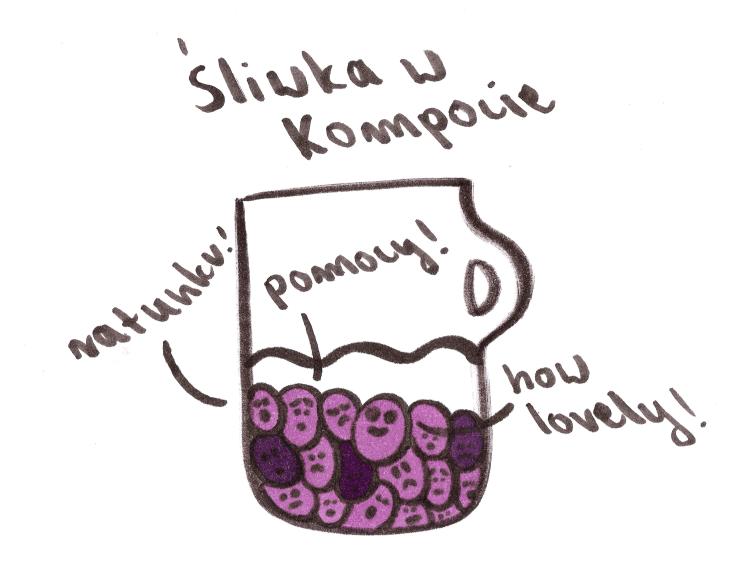Idioms can be confusing, especially if you understand the words literally. Often I jump to conclusions about what a Polish idiom means and end up getting it completely wrong.
The worst thing is… I tend to remember the wrong meaning more vividly than the actual one.
So here’s a small sample of Polish idioms I’ve misunderstood – all connected with food:
1. Wpaść jak Śliwka w Kompot
This is translated as ‘to get into hot water‘ and I like it because it’s so Polish. In the UK, we don’t have kompot and plums aren’t a popular fruit, so to understand this idiom you need to come to Poland and take a look at a jug of kompot.

Do the plums in a kompot jug look like they are in trouble? When I first came across this idiom I assumed, incorrectly, that it meant to be in a comfortable, familiar situation. Shouldn’t plums feel at home in a jug of kompot? After all, the plums are with friends! What’s more, I don’t think a plum in kompot is in that much danger. A lot of the fruit gets left behind once the kompot is drunk. I’d rather be a plum in kompot than a plum in jam or in bigos.
2. Jak Flaki z Olejem
Literally, this means ‘as tripe with oil‘. I had been offered flaki (tripe) many times in Poland (which I politely refused) before I came across this idiom. So I associated flaki with something very ugly…even a little exotic…and frankly disgusting.
So when I came across the idiom, I assumed it meant either disgusting or ugly. In English we have an expression that something looks like a ‘dog’s dinner‘, meaning that it’s a mess or really horrible to look at. I figured flaki z olejem meant the same.
I was surprised when I later saw the idiom in its full version ‘nudny jak flaki z olejem‘ which is best translated by the English idiom: ‘dull as ditch water’.
Now I feel sorry for all those Poles who had to eat tripe for every meal so that it became the definition of boredom!
3. Bułka z Masłem
I first heard this idiom when listening to a shanty in the port of Sztynort in Mazury. Maybe it was the context that fooled me because the shanty was about a sailor who survived a storm, reached Sztynort and ate a bread roll with butter. So I assumed its meaning was connected to safety or stability. You know, the kind of thing a fireman would say after it turns out that there’s no bomb in the building. ‘It’s okay, just a false alarm, everything is safe and we can all go home and eat a bread roll with butter‘.
Of course, bułka z masłem actually means that something is ‘easy/simple‘. I guess it’s pretty straightforward to spread butter on a roll, but it’s not so easy to understand why it was included in that shanty.
Curiously, the English language also uses food idioms to describe something that’s easy:
- a piece of cake (UK)
- as easy as pie (US)
…except both are a bit more posh than the Polish bułka.
In Conclusion
The Polish language is full of great food idioms. Indeed, you could eat a three-course meal consisting of idiomatic foods only:
Client: What do you recommend?
Waiter: Well for a starter, I recommend flaki z olejem.
Client: No, that’s a bit boring. Anything else?
Waiter: Perhaps…dwa grzyby w barszczu?
Client: Barszcz is fine, but I’ll just have one grzyb..save some room for desert.
Waiter: As you wish. For the main course, we have some niezły bigos.
Client: Perfect, I’ll have the bigos. Can you serve it with bread and butter?
Waiter: Dla nas to jest bułka z masłem.
Client: I’d prefer bread if you have it.
Waiter: And for desert, the icing on the cake, wisienka na torcie.
Client: Delicious.
Waiter: Anything to drink?
Client: Kompot…with plums?
Waiter: Certainly…and I assure you that no plums were harmed in the making of the kompot.
Dialog jest genialny 🙂
LikeLiked by 1 person
I love your blog so much and your posts made me happy so many times you would not believe.
LikeLiked by 1 person
Thank you. It makes me happy to hear it!
LikeLike
sorry, I don’t mean to confuse you but… we do put plums in bigos 🙂
LikeLike
I know. I wanted to express the (rather bizarre) thought that I’d rather be a plum in kompot than a plum in bigos 😉
LikeLike
Hillarious dialogue. At first I thought this blog was written by a Pole living in Britain. Congratulations on your level of Polish language! It really impressed me, especially the number of idiomatic expressions you know. Powodzenia w dalszym pisaniu bloga, trzymam kciuki (look, another idiom) 🙂
LikeLiked by 1 person
dzięku-you bardzo 🙂
LikeLike